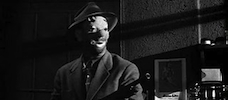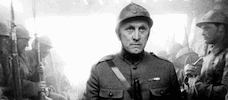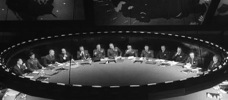Reviews
Stanley Kubrick
UK, 1964
Credits
Review by Timothy Sun
Posted on 08 March 2010
Source Columbia Pictures DVD
Categories Kubrick
The Civil War general William Tecumseh Sherman famously said, “War is hell.” Stanley Kubrick, in Dr. Strangelove Or: How I Learned to Stop Worrying and Love the Bomb, begs to differ: War is sex.
From the opening shot of a refueling plane inserting its phallic nozzle into its bomber “mate,” Dr. Strangelove is obsessed with the twin male urges of war and sex—or, more precisely, how an impotent yet libidinously charged patriarchal power structure supplants sex with war in a massive effort to assert its masculinity. For Kubrick, the Cold War’s escalating nuclear standoff is akin to one long cock tease, each side constantly taunting the other with a mine’s-bigger-than-yours schoolyard show of burgeoning manhood, each side stroking itself into a frenzy, simultaneously denying and yearning for the climactic release of, finally, all those primed and readied nukes going off.
To appreciate Kubrick’s audacity in arguing this thesis - in a comedy, no less - consider that the film was released barely a year after the Cuban Missile Crisis; the preview screening was, in fact, scheduled for November 22, 1963, but was pushed back after events in Dallas that same day made a movie that skewered the President of the United States seem in poor taste. To a modern audience (or at least an audience not old enough to remember the darkest depths of the Cold War), Strangelove is farce; to its contemporary audience, the film’s humor must’ve hit discomfortingly close to home. Bosley Crowther in The New York Times called it “the most shattering sick joke I’ve ever come across,” and was “troubled by the feeling, which runs all through the film, of discredit and even contempt for our whole defense establishment.” In just a few years, as Vietnam escalated, that contempt for the defense establishment would spread across the country and, post-Watergate, Kubrickian cynicism toward our leaders (and each other) would become the salient characteristic of our body politic. And while Mutually Assured Destruction is no longer the underlying principal of our foreign policy, we did just wrap up eight years of foreign policy governed by paranoid, xenophobic, preening male bluster. Almost all of Kubrick’s films seem to exist outside of time, none of them growing dated. And even here, in his most specifically timely work, about a particular moment and a particular national anxiety that has come and gone, he still seems prescient. It’s almost too easy to see a certain former president in the Slim Pickens role, donning a cowboy hat before riding off into military disaster.
Disaster in the film is precipitated by General Jack Ripper, a psychotic air force general who sets the film in motion by ordering American bombers to blow their loads on their Russian targets. Like his namesake, General Ripper is a man governed by sexual preoccupations. Kubrick’s phallic metaphors are none too subtle: one of the first shots of Ripper is a low angle close-up of his face, with an emphasis on the huge cigar jutting out of his mouth. Later, when troops attack his base, he fires back with a gigantic machine gun, which he cradles by his crotch. Ripper is spurred by his belief that water fluoridation is really a Soviet conspiracy to control all of our “precious bodily fluids.”1 He came to this realization in a bout of impotence, which has since led him to deny his “essence” to women. American male virility thus wounded, the only recourse is overcompensation on an absurd scale: nuclear war.
The other major American military figure in the film, General Buck Turgidson (George C. Scott, in one of the finest comedic performances ever) is not without his own sexual hang-ups, starting with his name: “Buck” implies an energetic masculinity while “Turgidson” implies the opposite. Sure enough, even after his mistress practically begs him to do as he pleases with her, he refuses, telling her to wait. Turgidson instead saves his excitement for warfare, bug-eyed and nearly orgasmic as he describes, arms outstretched like a boy pretending to fly, how a well-trained pilot could slip through Soviet defenses. He practically salivates at the prospect of finally loosing his nukes, gleefully assuring the president that Soviet retaliation would take out only “10 to 20 million, tops!”
The two generals, who lead with their dicks, are contrasted with a character who leads with his … muff. President Merkin Muffley (Peter Sellers, in one of three roles) is the most feminized of the major characters—his name, after all, is derived from a term for pubic wigs and a slang term for “vagina.” More than merely impotent, then, the president is essentially castrated. In the masculine realm of war and foreign affairs, President Muffley is well-meaning but ineffectual: a world dominated by men and their murderous toys has no place for the feminine. Indeed, aside from the feminized president, there is only one woman in the entire film: General Turgidson’s mistress. She spends the entirety of her single scene in a bikini, fulfilling her feminine role as eye-candy. Similarly, President Muffley serves a sort of token role: he is the nominal civilian commander of the military, but he holds no power over it. Throughout the film, he is constantly at the military’s mercy; even as commander-in-chief, he cannot, through a law he forgot he signed, recall the bombers from their mission. In his hilarious conversations with the Russian premier (“Now then, Dmitri, you know how we’ve always talked about the possibility of something going wrong with the Bomb…”), he sounds less like a statesman and more like a mother admonishing a child. So much for the notion of a more peaceful world with a female president.
Dr. Strangelove himself (Sellers again) is the most outwardly impotent and the most blatantly perverse (check the name) of the major characters. Naturally, he is the US weapons mastermind. The wheelchair-bound former Nazi draws the link between Hitler’s systematic extermination and the superpowers’ threat to do the same, despite having waged the “good war” against just such aggression. Like an uncontrollable erection, Strangelove’s right arm shoots upward in a sieg heil salute as he gets more and more excited by the prospect of America’s nukes triggering the Soviet “doomsday device,” which will kill all human and animal life on the planet. Far from ending the world, such an outcome would allow the country to start over—Strangelove proposes hiding the political and military elite in underground mineshafts, accompanied by only the most desirable women in a ratio of 10 women for each man in order to repopulate the earth (and essentially completing the Nazi eugenics project). The grinning face of General Turgidson says it all: Nuclear holocaust ain’t so bad, as long as you are the patriarchal elite. Rejuvenated, Strangelove springs to his feet, now literally erect, shouting in ecstasy the last words of the film: “Mein Führer, I can walk!” Nuclear war erases Strangelove’s impotence, marking the victory of libidinal urges over rationality.
While each of these characters is sexually impotent in their own way, they’ve also made themselves politically and materially impotent. Fighting a nuclear war is different than fighting a conventional war: planning and technology are everything, and the opportunity for personal agency is necessarily limited. Kubrick’s visual style reflects as much, eschewing his usual fluid virtuosity for static compositions in the War Room scenes and shifting to a more dynamic handheld look for the battle scenes. In the face of nuclear war, the defense establishment’s best-laid plans are designed to work in spite of human error—or human wisdom. “Plan R,” the code name for General Ripper’s orders, is meant to be a one-way street, whether or not termination orders are later given. The Soviet doomsday device is to be triggered automatically, since, as Strangelove puts it, “no sane man” would do it himself. The bomber crew led by Slim Pickens’ Major Kong is constantly going through checklists and communicating via technical jargon, making sure they hit all the correct steps in bringing about an orderly end to the world. Like the cavernous War Room set that dwarfs the people in it, the picture that emerges is of a vast, endless bureaucracy coupled with a monstrous, deific technology that humans were smart enough to invent but powerless to control.
Deterrence strategy itself contributes to the impotence of the Cold War patriarchal power structure. Unlike most political-military strategies, deterrence relies on doing nothing. During the Cold War, the fact of Mutually Assured Destruction was theoretically supposed to forestall any nuclear attack since an attack would be met with retaliatory armageddon—once the US and Soviet Union reached nuclear parity on such a deadly scale, there should have been no worries about nuclear war since no one could have emerged the victor. And yet, the arms race continued well beyond the MAD threshold, with constant paranoia of a weapons gap—in the film, General Turgidson warns, absurdly, of a “doomsday gap” after it’s revealed that the Soviets have completed their doomsday device. And so we keep amassing weapons that we know, rationally speaking, will not be used, like a man with a harem of willing women he’s not allowed to touch. The Cold War, in Kubrick’s analysis, is all foreplay and no payoff. In the face of such blue-balled anxiety and circumscribed individual power, where technology, bureaucracy, and the very strategy to be upheld saps the “essence” from manhood, the only way an otherwise avoidable nuclear war can occur is if the men in charge indulge in a masturbatory release of their warheads. It is no coincidence that, as depicted on the big radar board in the War Room, the bombers making their way to Russia conjure the image of thousands of sperm cells swimming toward an egg.
Necessarily, the only character who succeeds in stabilizing the situation is an outsider: Group Captain Lionel Mandrake (Sellers again), whose Britishness and asexuality set him apart. Neither masculine nor feminine, nor coming from a culture burdened with maintaining a nuclear umbrella, Mandrake, whose name derives from a medicinal root noted for its calming and soporific effects, is the corrective Kubrick throws into his world of sexually frustrated, maniacal military men.
And then there is Slim Pickens’ Major Kong. At once faultlessly loyal, brave, and simple, Kong is perhaps Kubrick’s ultimate summation of the American character. Like the cinematic gorilla he is named for, Kong is exceedingly uncomplicated. He follows his one instinct, which is to carry out his mission, all else be damned. Unlike the other performances, Pickens plays his character deadly straight—legend has it that Kubrick never told Pickens he was making a comedy. Kong is the classic stooge, moved by forces entirely over his head. When he straddles his giant nuclear phallus and rides down toward his target, whooping orgasmically, he becomes the symbol of blind militarism, the wild ejaculation of a power structure and masculine psyche perverted by frustrated, godlike power beyond the realms of rational control.
These themes appear again and again in Kubrick’s work, though Dr. Strangelove is the only out-and-out comedy that addresses them. The farce of nuclear deterrence, of a world run by men who turn matters of life and death into a pissing contest, can only be met with farce. To underline that point, Kubrick shot the most famous movie ending to never see the light of the day—a pie fight in the War Room. Stills of the aftermath can be seen on the DVD, and from the looks of it the fight was epic. But it’s all the better that Kubrick cut this ending; to veer into pure slapstick after flawlessly walking the fine line of just-credible satire would have diminished the overall effect of the film. As the film exists, there is no fantasy pie fight to fall back on, only the very real footage of mushroom clouds. All one can do in a world that survives day to day on the knife’s edge is to chuckle, love the bomb and sing, “We’ll meet again.”
- An actual theory promulgated in the 1950’s and ‘60’s by right wing extremists like the John Birch Society.↩
More Kubrick
-

Stanley Kubrick’s Early Documentaries
1951-53 -

Fear and Desire
1953 -

Killer’s Kiss
1955 -

The Killing
1956 -

Paths of Glory
1957 -

Spartacus
1960 -

Lolita
1962 -

Dr. Strangelove or: How I Learned to Stop Worrying and Love the Bomb
1964 -

2001: A Space Odyssey
1968 -

A Clockwork Orange
1971 -

Barry Lyndon
1975 -

The Shining
1980 -

Full Metal Jacket
1987 -

Eyes Wide Shut
1999 -

A.I.
2001
We don’t do comments anymore, but you may contact us here or find us on Twitter or Facebook.



